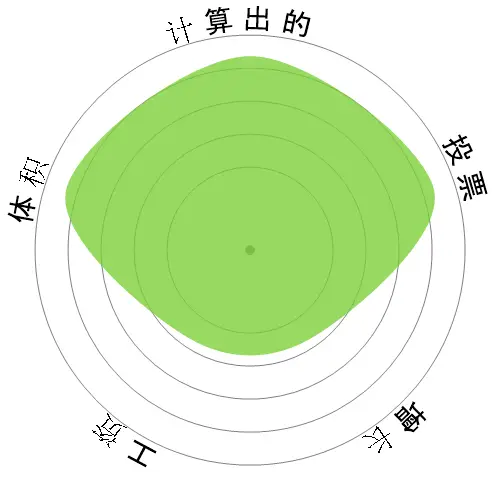中学教师(特殊教育和职业/技术教育除外)




人们还浏览了
计算自动化风险
最小风险(0-20%):这一类别的职业被自动化的可能性较低,因为它们通常需要复杂的问题解决能力,创造力,强大的人际交往能力和高度的手动灵巧。这些工作通常涉及复杂的手部动作和精确的协调,使得机器难以复制所需的任务。
有关这个分数是什么以及如何计算的更多信息可在这里找到。
用户投票
我们的访客投票表示,这个职业被自动化的可能性很低。 这个评估进一步得到了通过计算得出的自动化风险等级的支持,该等级预计有16%的机会实现自动化。
你认为自动化的风险是什么?
中学教师(特殊教育和职业/技术教育除外)在未来20年内被机器人或人工智能取代的可能性有多大?
情感
以下图表在有大量投票数据时会显示。这些可视化图表展示了用户投票结果随时间的变化,提供了情感趋势的重要指示。
随着时间(每年)的情绪变化
增长
预计到2033,"Secondary School Teachers, Except Special and Career/Technical Education"职位的空缺数量将减少0.6%。
总就业人数和预计的职位空缺
更新的预测将在09-2025到期.
工资
在2023,'Secondary School Teachers, Except Special and Career/Technical Education'的年度中位数工资为$65,220,或每小时$31。
'Secondary School Teachers, Except Special and Career/Technical Education'的薪资比全国中位工资高35.7%,全国中位工资为$48,060。
随着时间推移的工资
体积
截至2023,在美国有1,045,170人被雇佣为'Secondary School Teachers, Except Special and Career/Technical Education'。
这代表了全国就业劳动力的大约0.7%
换句话说,大约每145人中就有1人被雇佣为“Secondary School Teachers, Except Special and Career/Technical Education”。
工作描述
在中学级别教授学生一个或多个科目。
SOC Code: 25-2031.00


评论
Leave a comment
Due to remote learning and using similar designs that you mentioned, we have seen a 210% spike in high school drop outs, a 600% up shot of kids having at least 2-3 failing grades, and a gap between students who do not have access to tutors, internet or computers (or all three). A robot cannot tell an elementary student to reengage their students, let alone the sheer horror of classroom discipline being thrown out. Also, lets be real honest with secondary students, if they are given a generic problem trust me they will plagiarize and copy that down (just look at quizlet, or "write my paper" for proof). A human being needs to see if a student "gets" what is going on. A Teacher needs to have group interactions (and trust me you cannot do any sort of interactions with remote even with current programs- students just shut their cameras and mute themselves). Unless you are suggesting that a "few" will benefit from this dystopia, if so thank you Nancy Devos for your insight, but we educate everyone, and not the 1%.
Do you think the software being used led to those changes or the pandemic and economic downturn itself?
Easy to pass judgment when you have already drawn your conclusions. I've taught off and on since 2008 (mostly on, mostly secondary). Quizlet is the worst example you could provide of instructional technology we could employ to help all students.
When you discuss the one percent, you highlight a certain security the wealthy have that leads to less interruptions of education and that's a fair point. But I am not trying to describe a dystopia, but rather a better way to differentiate and tailor student learning to their particular needs, desires, strengths, and weaknesses.
Much of what effective teachers do is driven by inputs, points of data, about their students and their teaching. A properly designed system could analyze those inputs and apply strategies to intervene. It doesn't really matter the input, either.
Now that we are rolling out SEL technologies to help our kids, language translation applications that can help English learners, standards-based, interactively branching assessments and activities, the amount of information received is nothing trivial. The digital divide does truly make this a difficult prospect for some students, but that's not the question we are discussing here. Can teachers be replaced by "robots" in the future? Yes. Nothing would be more student-centred.
If the argument is about the socialization of students, that's not facilitated by teachers. It's actually stunted. Imagine learning plans that don't waste time with sages on stages. Imagine a truly adaptive system to check for understanding and intervene. Imagine that happening simultaneously for all students without the interruptions all teachers face daily just trying to teach. I realize virtual, and hybrid, learning did not go well for all students, but it was year one...something never attempted, and there was a society gone wild coupled with the inexperience of systems, personnel, and students.
I love teaching. I take it personally. But, if students were able to learn better from a robot than from me, I wouldn't take it personally. I'd celebrate it.
Learning with a teacher can mean a number of scenarios, including utilizing the learning software you mentioned.
The assurance of having someone who knows more than you, or at least knows where to find answers and explain them, will result in teachers have a very secure job.
I haven't even mentioned the emotional support and connection that makes a learning environment better, something I don't foresee AI replacing because seeing assuring words pop up on my screen is not the same as hearing it from a teacher, who is making eye contact with me and using body language.
关于这个职业请留下您的评论